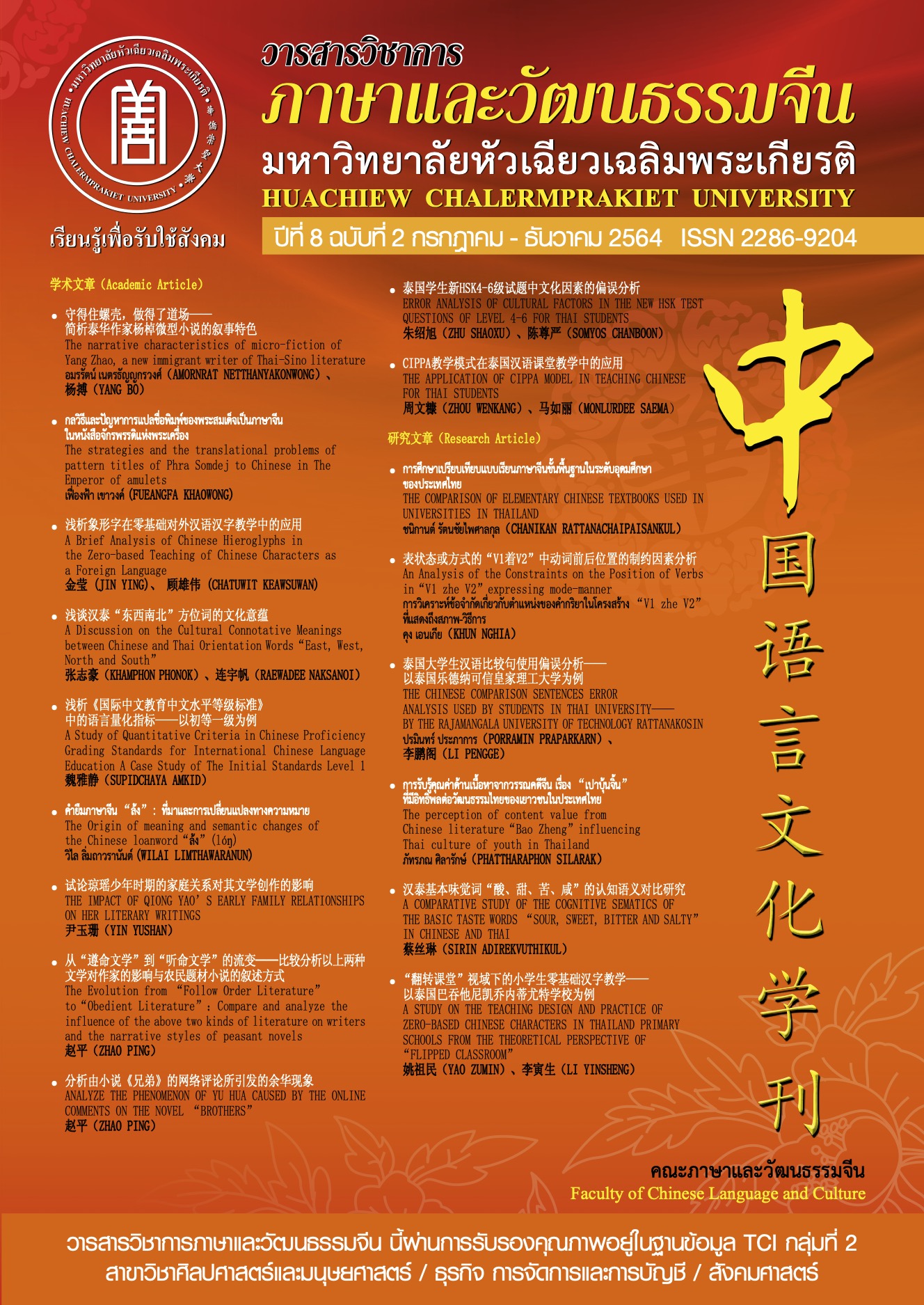The The Application of CIPPA Teaching Model in Thai Chinese Classroom Teaching
Keywords:
Key words:CIPPA teaching model;Thai students; Chinese ClassroomAbstract
ABSTRACT
This article takes 29 students in the basic Chinese class of the Faculty of Education, Chiang Rai Rajabhat University, Thailand as the research object, and then adopts the CIPPA teaching model for teaching practice. The research goal of this article is to design the CIPPA teaching model teaching plan for the comprehensive Chinese course of the Basic Chinese Class of the Faculty of Education of Chiang Rai Rajabhat University, Thailand, and to investigate the effectiveness of the teaching plan. Research tools include CIPPA teaching model teaching plan, pre-test and post-test papers. Using the experimental method, adopt the method of "single-group pre-test and post-test design" to investigate the changes in students' academic performance before and after the teacher uses the CIPPA teaching model to use the average , standard deviation (S.D.), E1/E2 and T-TEST to Perform statistical analysis of data. The following conclusions are drawn through analysis:
By comparing the efficiency of the experimental process and the experimental results, respectively: 85and 82.76. The effectiveness of the CIPPA teaching model teaching plan reaches the pre-experiment hypothesis: 80/80 standard, which shows that the CIPPA teaching model teaching plan has a certain degree of reliability. By comparing the data of the students before and after the test scores, it is found that the average of 41.38 of the students' post-test scores is higher than the average of the previous test scores of 33.21, and the significance is less than 0.01, and the test results are significant. It shows that after the teachers use the CIPPA teaching model to teach, the students' Chinese learning performance has been significantly improved.
Key words:CIPPA teaching model;Thai students; Chinese Classroom
References
何维民、王丽娟、齐宏.关于适应21世纪人才培养的思考与探讨.[J].思想政治教育研究,
,1(3):2-3.
李声明.二十一世纪信息化人才培养和教育的新思考.[J].广西商业高等专科学校学报,
,21(2):14-16.
西丽娜.CIPPA 教学模式在泰国初中汉语综合课教学中的运用研究——以清迈府芳巧努拨堂
学校为例.[D].云南师范大学硕士学位论文,2018.
Jitrada Hengchaiyo and Intira Robroo.Science Learning Achievement and Attitudes of the Ninth Graders Students Learning through the CIPPA Model.[J].Journal of Lanna Academic Affairs,2016,8(1):40-48.
Kultida Khonsagiam.A Study of English Writing Achievement by Using CIPPA Model For Mutthayomsuksa 1 of Watprompetch School.[J].Suthiparithat,2014,28(87):237-251.
Pathitta Chaitip and Sathaporn Khanto.The Study Of Thai Writing Skills For Matthayomsuksa 1 Students Using CIPPA MODEL.[J].Journal of Education Graduate Studies Research Khon Kaen University,2010,4(04):89-98.
Thissana Khemmanee.Student Centered Instructional Management:CIPPA MODEL.[J].
Academic Journal Chulalongkorn University,1999,05(03-06):2-30.
Warinthorn Jantarachit and Preemon Nakarin and Pananoi Rodchoo.Effects of Using CIPPA MODELto Enhance English Speaking Skill of Vocational Certificate Students.[J].Journal of Education Sukhothai Thammathirat Open University,2014,4(07):136-142.
Downloads
Published
How to Cite
Issue
Section
License
บทความที่ได้รับการตีพิมพ์เป็นลิขสิทธิ์ของวารสารภาษาและวัฒนธรรมจีน มหาวิทยาลัยหัวเฉียวเฉลิมพระเกียรติ
บทความใน “วารสารวิชาการภาษาและวัฒนธรรมจีน” เป็นทรรศนะของผู้เขียนโดยเฉพาะ กองบรรณาธิการไม่มีส่วนในความคิดเห็นในข้อเขียนเหล่านั้น




